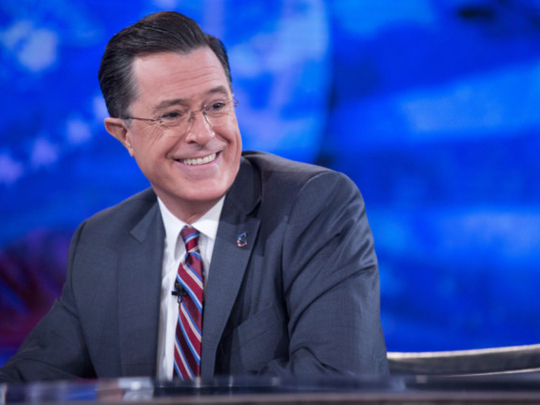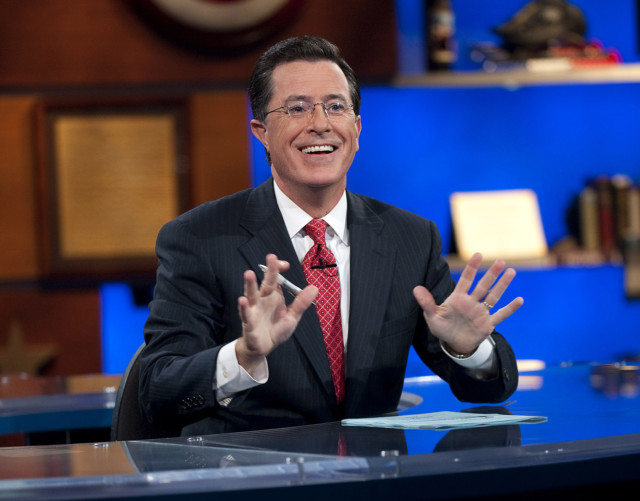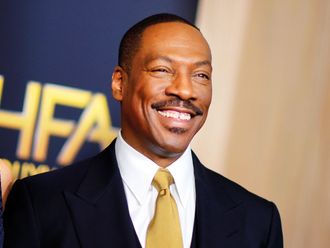
A studio filled with an incongruous group of celebrity guests — Mayor Bill de Blasio, Big Bird, Ambassador Samantha Power, Yo-Yo Ma, Gen Ray Odierno, Cyndi Lauper — singing We’ll Meet Again was a little weird, but so were the commercials that bracketed the occasion: ads for scotch, beer and dating services called Asiandate.com and Anastasiadate.com.
The final episode of The Colbert Report on Thursday was a sad turning point, maybe, but it was also a happy reminder of how much of an anomaly that late-night comedy series really was: like The Daily Show, it became a vanity destination for the establishment in-crowd on Comedy Central, a cable channel that caters to the young and seemingly lonely (and thirsty).
For nine years, Stephen Colbert brilliantly kept up an unlikely, complicated and delightful imposture. He delivered wicked political satire by pretending to be a right-wing, monomaniacal cable talk-show host. It was a double cross. Colbert was also a middle-aged comedian who tapped into a millennial sensibility.
So, of course, with characteristic brio and mock pomposity, Colbert stepped down as he prepares to replace David Letterman, who will leave the Late Show on CBS in 2015. (The Colbert Report spot will be taken by The Nightly Show With Larry Wilmore, a onetime Daily Show correspondent.) Since the succession at CBS was announced, there has been much hand-wringing, not so much over Letterman’s retirement as the loss of Colbert’s mock persona. People wonder how this comedian will manage once he drops his Comedy Central mask and has to be himself on the Late Show.
Actually, he won’t have to be his real self onstage any more than Letterman or Jimmy Kimmel or Seth Meyers has to. Talk shows are acting jobs, except that the hosts play themselves, rather than fictional characters. They maintain public personas that often have very little to do with the people they are privately.
Letterman, like his hero, Johnny Carson, is a notorious grump and loner once the studio lights go dark. Offstage, Jay Leno loves cars more than people. Rosie O’Donnell, who crosses swords and curse words with Whoopi Goldberg on The View, was once called the Queen of Nice on the cover of Newsweek. Viewers are not meeting the real Ellen DeGeneres when they watch her gambol with guests any more than they are seeing the real Meryl Streep when she plays Julia Child.
Colbert, who so brilliantly played a caricature of a Fox News talk-show host, spent his last week showing that he wouldn’t have any trouble dialing it back to become a charming, witty comedian with his own network talk show.
He won’t change much, but his material probably will. Thursday night’s episode was a valedictory showcase, but there was still plenty of time for barbed political commentary. In his segment The Word, Colbert noted that now, as in 2005, the year his show started, people on television are defending torture, and troops are once again being sent to Iraq. The sardonic crawl accompanying his monologue read, “We’ll be greeted as returners.”
Network talk-show hosts also make political jokes in their opening monologues, but their jabs at Obamacare or government gridlock are small asides on platforms that thrive on common-denominator comedy and celebrity rubbernecking.
The Colbert Report, like The Daily Show With Jon Stewart, was notable for using celebrity appearances to keep the political agenda aloft. Quite often, the guests weren’t even famous, and Colbert interviewed scores of elected officials, journalists and scientists.
As Thursday night’s ads suggested, Comedy Central’s core audience is small and relatively narrow, and it’s not at all surprising that Colbert was persuaded to leave it for CBS. It’s more surprising that Stewart, who has hosted The Daily Show since 1999, is staying on Comedy Central, at least for now. He made a cameo appearance on Colbert’s final episode; on his own show Thursday, he also reminded viewers why they came to Comedy Central in the first place.
Stewart made fun of the meltdown at Sony, whose controversial comedy about North Korea, The Interview, now shelved, appears to have inspired hackers to leak thousands of embarrassing company documents and emails.
Stewart chided the North Korean leader, Kim Jong-un, for being angry at Hollywood, saying he should love it instead because Hollywood is just like North Korea.
“Everyone’s always telling you how great you are,” he said. “There are billboards everywhere with your face on them, and no one eats.”
When he gets to CBS, Colbert is unlikely to go on those kinds of prolonged riffs about touchy political issues. On Comedy Central, there remains one established host who talks about little else. The Colbert Report is gone. And that makes The Daily Show all the more valuable.












